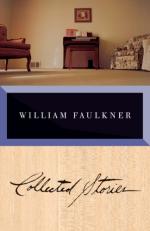|
This section contains 662 words (approx. 3 pages at 300 words per page) |

|
Faulkner's characters become grotesque when they seize upon some way of ordering their experience and impose it on their worlds without regard for the consequences. For example, Abner Snopes in "Barn Burning" (Harper's Magazine, 1939), builds the meaning of his life out of an absolute sense of personal honor. Unable to brook any challenge to that honor, he fires his successive landlords' barns in revenge for slights he often provokes himself. As a result, he keeps his large family perpetually on the move and finally drives away his son, Sarty, who will not live by his father's code.
Grotesque characters sometimes lead to a Gothic story. Faulkner's first major published story was "A Rose for Emily" (The Forum, 1930). Emily Grierson becomes entrapped in conventional aristocratic expectations for women.
She struggles against these restrictions, imposed upon her by her family and by her whole community, by clinging to those she...
|
This section contains 662 words (approx. 3 pages at 300 words per page) |

|



